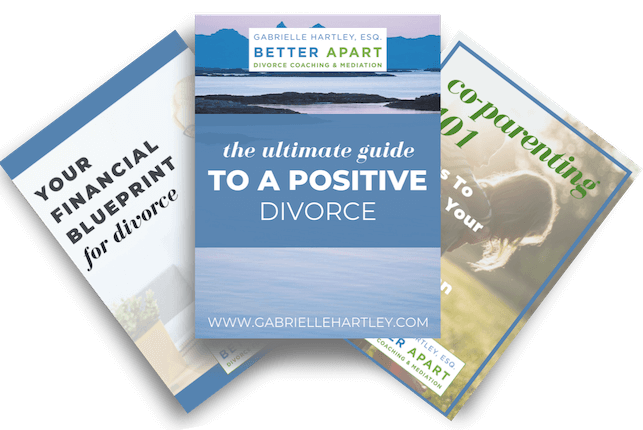Deciding to stay in or leave your marriage is one of the most difficult decisions you’ll ever make.
For most of us, the decision of whether to divorce is wrapped up in guilt and fear. Fear of financial insecurity, fear of being alone, and worst of all, fear of making a mistake.
Too often when we’re agonizing over this we rely on our feelings for the answers, but unfortunately, as they say, feelings aren’t facts, and moreover our feelings are often muddy and confused — and if they were clear we wouldn’t be agonizing in the first place, would we?
So if we don’t rely on our feelings, then how do we decide? Here are my top tips for making the most difficult decision of your life:
1. Keep the focus on yourself. When we’re grappling with the decision of whether to divorce, it’s so tempting to want to blame the other person for all their ills and wrongdoings, but this is a huge mistake when trying to decide whether to stay or go. While most of us know that 50% of first marriages fail, what is less known is that 68% of second marriages also fail, and 74% of third marriages do too. This is because we’re not doing the necessary work on ourselves to figure out what went wrong the first time. We trade out the person, but end up making the exact same mistakes the second and third times around. So before you can get clarity on your predicament, you first need to look at yourself. What’s your attachment style? What kind of wounding or trauma do you have from your childhood (we all have something!!) that might be impacting the way you show up in relationships? How does that wounding determine the partners you choose? If your marriage is in any way abusive this isn’t an opportunity to victim-blame, but rather a way to look at where you need to heal in order to stop choosing abusive partners. If your marriage is just “fine” but you feel dissatisfied and itchy, perhaps there’s something within you that needs attention that your marriage isn’t responsible for fulfilling.
2. Look for equal commitment to growth. We all grow and change over time. The question is, does your partner support your growth, will they join you in it, or do they feel threatened by it and attempt to block it? If you’ve asked your partner to go to therapy with you, have they gone willingly? (If a partner refuses to go to couples therapy for any reason, this should be seen as a pretty big red flag.) We don’t all grow at the same rate and in the same timeframe, so there’s no need to judge someone else’s journey (see #1 above), but marriage is no place for stagnation, and most marriages in which one partner refuses to do any personal development work will fail.

4. Get professional help. The help of a good therapist or coach (hi!) will be invaluable in your quest for clarity. Find someone who specializes in this area (again, hi!), who can guide you on an unbiased journey through your personal and relational exploration. You should look for someone with training and experience with Family Systems or Emotionally Focused Therapy. Training and understanding of the work of John Gottman and The Gottman Institute is a must. Not all therapists and coaches are created equally, so do your research and find someone good!
One of the most important questions to ask yourself at this juncture is, “Am I truly ready for answers?” Deciding whether to divorce is not easy. There is a lot of comfort in sitting on the fence. One the one hand, you don’t have to fully commit to your marriage. On the other, you don’t have to commit to leaving. But sitting on the fence also keeps you in limbo, neither in nor out of a relationship, and on either side of that fence is the opportunity for happiness and fulfillment — as long as you’re ready to find and create it for yourself.

Kate empowers women to find their strength, passion, and confidence even in the most disempowering of circumstances and helps them move forward with concrete plans set on a solid foundation, putting their children at the center (not in the middle) of all their decisions.
In addition to her online programs, Kate works privately with clients all over the world.
Find out more at www.kateanthony.com

Get Your FREE Divorce Survive & Thrive Kit!
Includes a financial blueprint for divorce, a co-parenting guide, and the BEST strategies to help you stay positive and take care of yourself during divorce and beyond.
[mailerlite_form form_id=2]


Revolutionizing the conversation around Divorce, one internal narrative at a time.
MENU
FOLLOW GABRIELLE
DISCLAIMER: The commentary, advice, and opinions from Gabrielle Hartley are for informational purposes only and not for the purpose of providing legal advice or mental health services. You should contact an attorney and/or mental health professional in your state to obtain advice with respect to any particular issue or problem.
CONTACT GABRIELLE
NORTHAMPTON ADDRESS: 76 Masonic Street, Northampton, MA 01060
NYC ADDRESS: 150 East 52nd Street, Suite 1002, New York NY 10022
STATEN ISLAND ADDRESS: One Edgewater Plaza Suite 304, Staten Island, NY 10305
PHONE: 413.341.0034/ 917.757.0980

